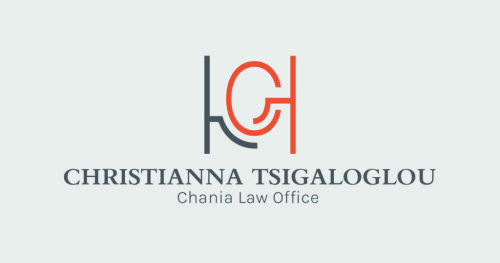Best Mortgage Lawyers in Chania
Share your needs with us, get contacted by law firms.
Free. Takes 2 min.
Free Guide to Hiring a Real Estate Lawyer
List of the best lawyers in Chania, Greece
About Mortgage Law in Chania, Greece
A mortgage in Chania, Greece is a legal agreement where real estate property is used as collateral to secure a loan typically granted by a bank or other financial institution. The borrower receives funds to purchase, construct, or renovate a property, and the lender has the right to claim the property if the borrower fails to repay the loan as agreed. Greek mortgage law regulates the creation, registration, and enforcement of mortgage rights and is closely tied to property laws. In Chania, practices reflect national legislation but can involve specific regional procedures and requirements, especially regarding documentation and property registration.
Why You May Need a Lawyer
There are several situations in which individuals and businesses may require legal assistance with mortgages in Chania:
- Negotiating or reviewing mortgage contracts before signing
- Ensuring that the property title is clean and free from prior encumbrances or legal challenges
- Clarifying the legal responsibilities and consequences of default
- Resolving disputes with lenders or other parties involved
- Handling foreclosure proceedings or preventing unauthorised actions on your property
- Complying with specific Greek and local legal and tax requirements for foreign buyers
- Translating or interpreting documents if you are not fluent in Greek
- Completing proper registration of the mortgage at the local land registry office
Local Laws Overview
Mortgage law in Chania is governed by the Greek Civil Code, which outlines the process of granting and registering mortgages, rights of lenders and borrowers, and procedures in the event of loan default. Some key aspects relevant to Chania include:
- Mortgages must be registered at the local land registry (Hypothikofylakeio) or cadastral office (Ktimatologio) to be valid and enforceable
- Only properties with clear and undisputed titles can be mortgaged
- Foreign nationals can usually obtain mortgages, but special due diligence is necessary to comply with ownership and residency laws
- Foreclosure procedures in Greece require court intervention and are subject to specific timelines and debtor protections
- Interest rates, fees, and terms are generally set by individual lending institutions but must comply with Greek financial regulations
- Prepayment or early mortgage settlement may incur penalties, depending on contractual terms
Frequently Asked Questions
How do I get a mortgage for a property in Chania?
You will need to apply through a Greek bank or authorised financial institution. Generally, you must provide proof of income, legal identification, tax records, and information about the property. The process also requires a thorough property title check.
Can foreigners purchase property with a mortgage in Chania?
Yes, foreigners can obtain property and mortgages in Chania, but banks may have additional requirements. Legal review is highly recommended to avoid complications with residency status or ownership restrictions.
Do I need a lawyer to buy property with a mortgage in Chania?
While not legally required, it is strongly advised to consult a lawyer to review contracts, verify property title, manage negotiation, and ensure compliance with Greek law.
What happens if I default on my mortgage?
The lender may initiate foreclosure proceedings through the courts, which could result in the forced sale of your property to recover the debt. Legal protections exist, but prompt advice is vital if you face difficulty making payments.
How do I check if a property has an existing mortgage?
A search at the local land registry (Hypothikofylakeio) or cadastral office (Ktimatologio) will show any existing mortgages or encumbrances attached to a property. A lawyer can assist with this process.
Is mortgage registration mandatory in Chania?
Yes - unregistered mortgages are not legally enforceable. Proper registration at the local authorities is essential to protect both the borrower and the lender.
Can I pay off my mortgage early?
Yes, most lenders allow early repayment, but you may be subject to fees or penalties depending on your mortgage agreement. Always check your contract or consult a legal advisor.
What legal checks should I do before buying with a mortgage?
Verify the seller's title, check for outstanding debts or liens, ensure proper permits and compliance with urban planning laws, and confirm the property's registration details.
What costs are involved besides the down payment?
Expect notary fees, land registry fees, tax obligations, lawyer's fees, bank charges, and possibly surveyor and translation fees.
Are there tax implications for taking a mortgage in Chania?
Yes, property acquisition, ownership, and transfer are subject to taxation in Greece. Your lawyer or tax advisor can help clarify applicable taxes and potential deductions based on your individual situation.
Additional Resources
If you need more information or assistance regarding mortgages in Chania, the following resources can be helpful:
- Chania Bar Association
- Local land registry (Hypothikofylakeio) or cadastral office (Ktimatologio)
- Greek Ministry of Justice
- Hellenic Bank Association
- Notaries Public in Chania
- Greek Ombudsman (for dispute resolution)
Next Steps
If you require legal guidance for a mortgage issue in Chania, Greece, consider the following steps:
- Gather all relevant documentation regarding the property and proposed loan
- Contact a qualified lawyer experienced in real estate and mortgage law in Chania
- Schedule a consultation to discuss your needs and receive practical advice
- Request a title search and contract review before signing any agreements
- Follow your lawyer's instructions regarding official registrations and tax obligations
- Keep records of all contracts, payments, and correspondence for your files
Taking these steps will help you navigate the mortgage process in Chania securely and in compliance with Greek law, safeguarding your property and financial interests.
Lawzana helps you find the best lawyers and law firms in Chania through a curated and pre-screened list of qualified legal professionals. Our platform offers rankings and detailed profiles of attorneys and law firms, allowing you to compare based on practice areas, including Mortgage, experience, and client feedback.
Each profile includes a description of the firm's areas of practice, client reviews, team members and partners, year of establishment, spoken languages, office locations, contact information, social media presence, and any published articles or resources. Most firms on our platform speak English and are experienced in both local and international legal matters.
Get a quote from top-rated law firms in Chania, Greece — quickly, securely, and without unnecessary hassle.
Disclaimer:
The information provided on this page is for general informational purposes only and does not constitute legal advice. While we strive to ensure the accuracy and relevance of the content, legal information may change over time, and interpretations of the law can vary. You should always consult with a qualified legal professional for advice specific to your situation.
We disclaim all liability for actions taken or not taken based on the content of this page. If you believe any information is incorrect or outdated, please contact us, and we will review and update it where appropriate.










